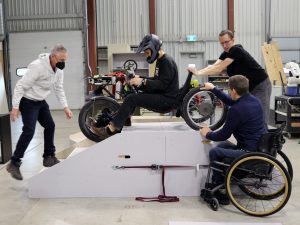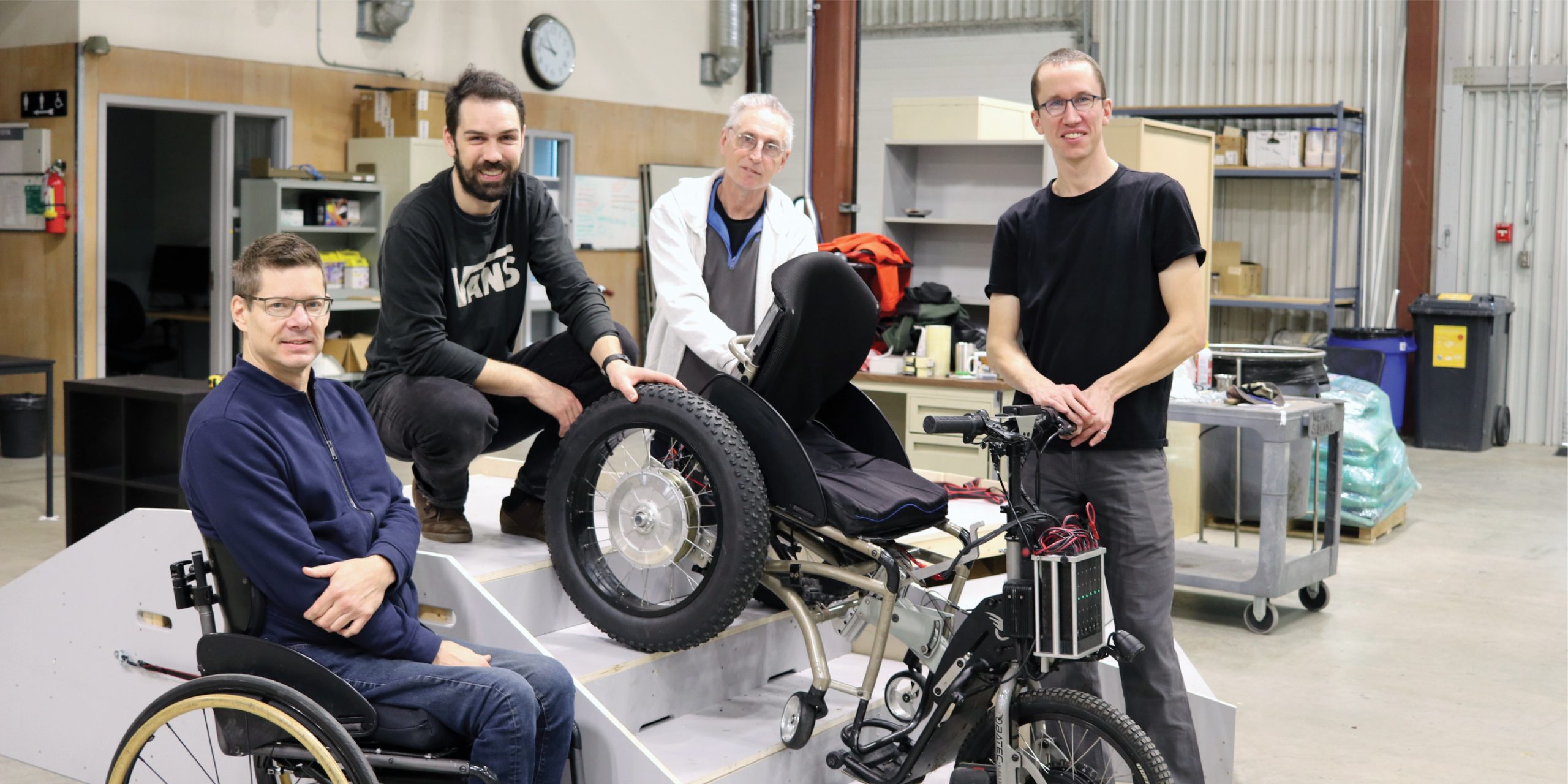On behalf of the Honourable François-Philippe Champagne, Minister of Innovation, Science and Industry, the Honourable Pablo Rodriguez, Minister of Transport of Canada and Quebec Lieutenant, announced more than $515 million in funding for research infrastructure through the Canada Foundation for Innovation (CFI).
BCIT is among the 32 post-secondary institutes and research hospitals, as well as 100 infrastructure projects across the country that will receive funding to advance research and innovation in Canada. BCIT is the recipient of funding for two projects.
Building better wheelchairs

Dr. Jaimie Borisoff, Director of MAKE+ and former Canada Research Chair, received $1,011,000 for his project on Advanced Mobility Devices to Expand Wheelchair Capabilities for Increased Community Participation. As wheelchair designs become more innovative and sophisticated, it is important that the reliability of their safety and performance be evaluated. It is also clear that new capabilities need to be developed to improve the lives of people with disabilities.
New wheelchair technologies have been created to overcome some of the serious drawbacks of existing mobility products. These include wheelchairs with robotic skills like stair-climbing, as well as hybrid-manual wheelchairs with ebike-like power-assist units that can be attached to the wheelchair when desired. The funding will allow Dr. Borisoff and his team to evaluate the safety, reliability, and effectiveness of these innovative new wheelchairs. The work will guide clinicians and consumers in how they select and use these new products, as well as provide evidence to justify their purchase by various funding authorities.
Dr. Borisoff and his team will also develop new hybrid-manual wheelchairs with expanded features and capabilities. These new features will allow users to navigate more difficult places like off-road trails and snowy terrain, and tackle more difficult obstacles. These systems will be tested in several ways, including at the international Cybathlon Powered Wheelchair Race. The long-term goal is to create and commercialize hybrid-manual wheelchair products that can empower people with disabilities.
A partnership with the University of Manitoba will test the existing and newly created devices in snow and other winter conditions. The teams are also interested in how these new technologies could improve wheelchair mobility in rural and northern settings.
Read more about this exciting project.
Pinpointing supernovae faster and with more accuracy

In 2019, Dr. Barry Pointon joined the Canadian Hyper-K group to work with researchers and students involved in the world-leading Super-Kamiokande (Super-K) and the Hyper-Kamiokande (Hyper-K) neutrino physics experiments in Japan. In the CFI funding announcement, Hyper-K Canada was awarded $6.35 million from the CFI IF 2023 competition to support in its hardware development and deployment at Hyper-K which is currently under construction with operations expected to begin in 2027. The project, Water Cherenkov Calibration for Hyper Kamiokande, is led by University of Victoria researchers. Thanks to this funding, BCIT, along with other Canadian researchers and institutions, including TRIUMF, can be part of this groundbreaking $600 million experiment that aims to study neutrinos to enhance our understanding of the story and fundamental principles of the universe.
Dr. Pointon and BCIT students have been actively involved in projects for Super-K and Hyper-K, including applied research and development of advanced software for data analysis. One challenging and crucial task involved improving the speed and accuracy of the method to pinpoint the location a of supernova in the sky at Super-K. When a star explodes, it releases neutrinos even before light. The ability to detect and analyze these neutrinos quickly allows astronomers precious time to train their ground and space-based telescopes on the supernova event. Remarkably, using both computing skills and techniques from nuclear medicine, the BCIT effort managed to decrease the time needed for a vital calculation from minutes to seconds. This software is now in use at Super-K. Additionally, BCIT students have contributed to the supernova early warning system, known as SNEWS.
This involvement has provided many BCIT students amazing opportunities to use their skills in projects supporting cutting-edge, international scientific enterprises.
Quotes
The Honourable François-Philippe Champagne, Minister of Innovation, Science and Industry
“My compliments to top-tier researchers who will get a boost through this vital funding to take their projects to the next level. It will also support future generations by enabling students and postdoctoral researchers to acquire and hone the skills and knowledge they need to excel in their challenging fields.
Their pioneering research will cement our position as a global leader in innovation while helping to drive our economy and achieve our shared vision of a brighter, healthier future for all Canadians.”
Have you subscribed? Sign-up to receive the latest news on BCIT.
Roseann O’Reilly Runte, President and CEO of the CFI
“Research labs and facilities, like those being funded today, provide the foundation upon which Canada’s research leaders can make discoveries and drive innovation that will contribute to a better future for all of us.”
Dr. Jeff Zabudsky, President, BCIT
“From advances in wheelchair technology, to advancing our understanding of the universe, BCIT researchers are putting Canada at the forefront of global innovation. Investment from the Canada Foundation for Innovation enables BCIT students, researchers, and faculty to continue to push boundaries and advance applied research in their respective industries. Dr. Jaimie Borisoff, Dr. Barry Pointon, and their colleagues embody the BCIT Vision of empowering people, shaping BC, and inspiring global progress.”
Dr. Kim Dotto, Dean, Applied Research and Centre for Applied Research and Innovation, BCIT
“For over three decades, BCIT researchers and research groups have forged strong partnerships with industry and academia – playing a pivotal role in the creation of innovative technologies, products, and services. These projects underscore BCIT’s role as a leader in applied research, making real-world impacts and advancing the state of practice.”
Dr. Mario Pinto, University of Manitoba Vice President Research and International
“Congratulations to these researchers for receiving support through the CFI – Innovation Fund to advance this innovative research. I’m confident that by combining expertise from University of Manitoba and BCIT, this work will lead to improved accessibility for Canadians and those abroad who struggle with mobility issues.”

great share , so inspiring
Thank you for your article. Great read
Snow season is a killer for power chairs i.e. 5-10 cm means “Snowed in.”
Good work and research 🙂